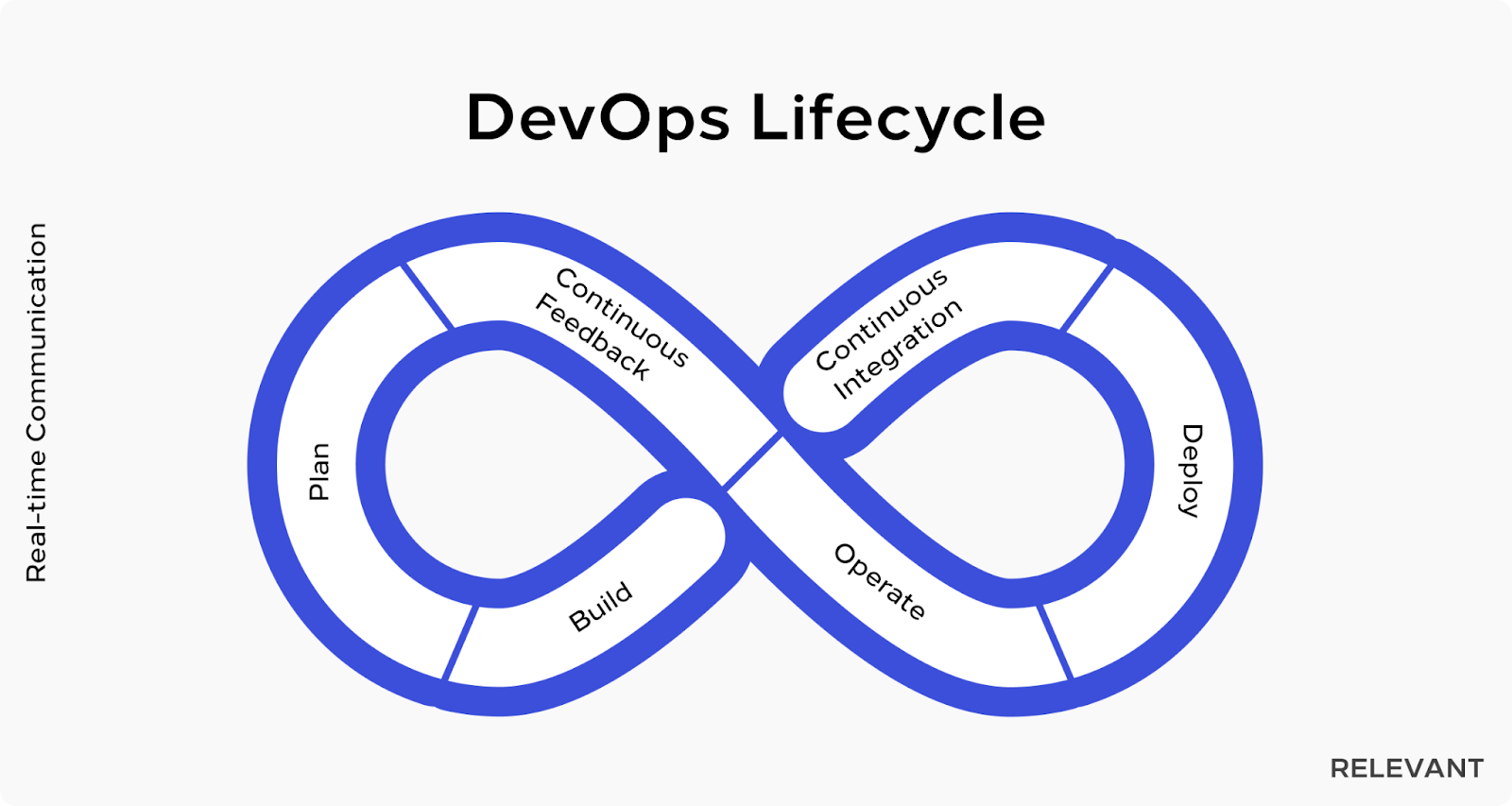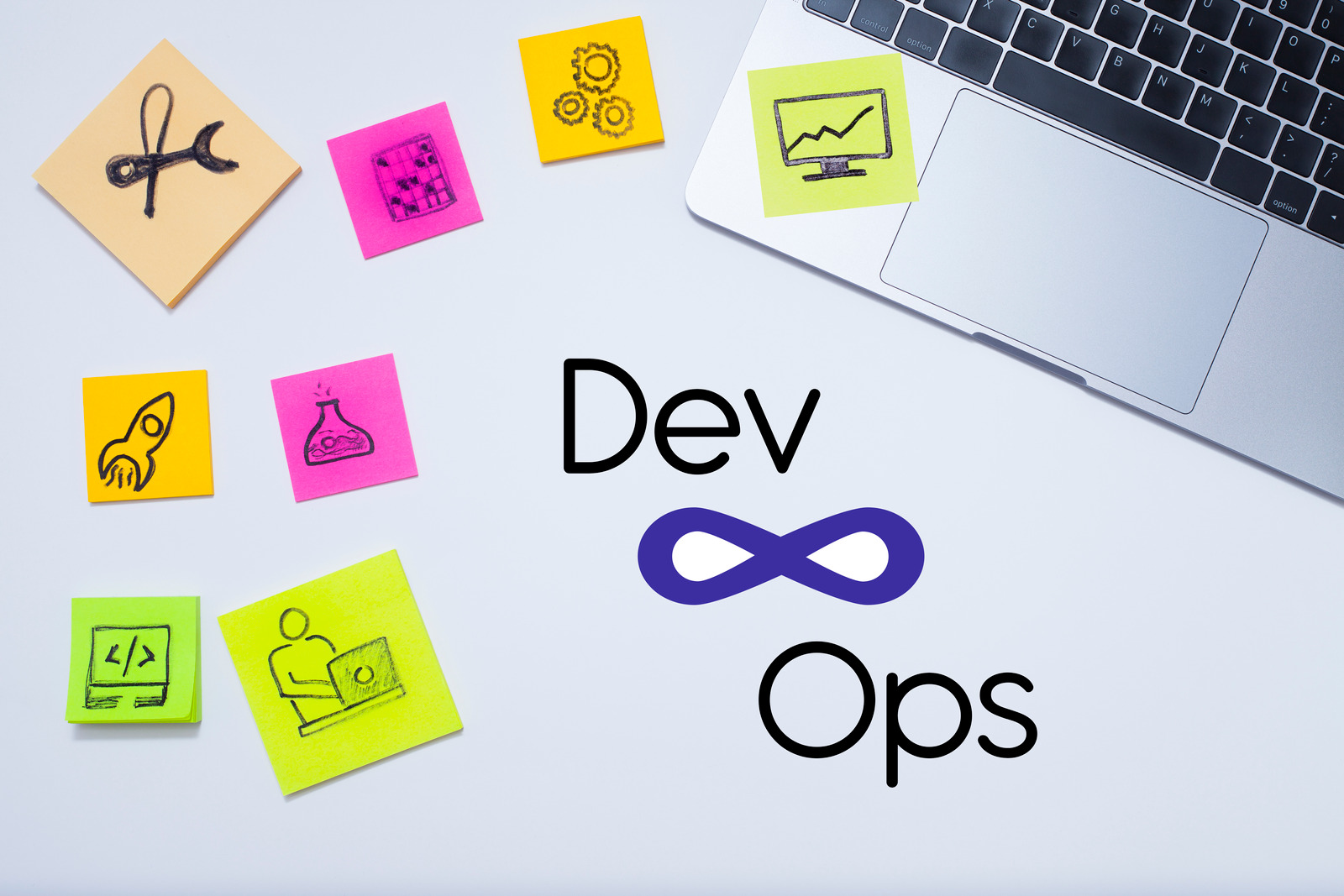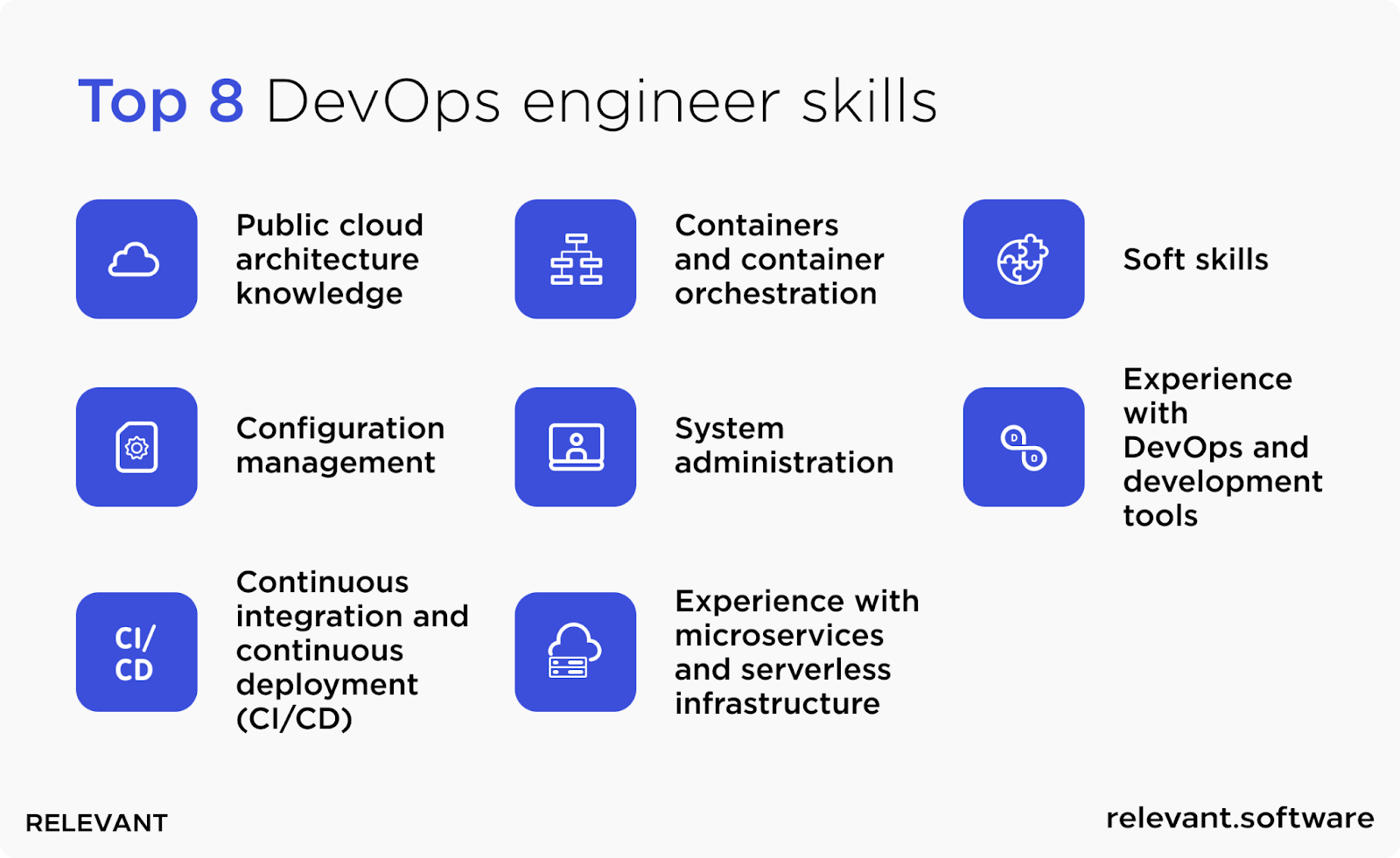DevOps Engineers: An overview of key skills, roles, and salary in 2023

DevOps engineers are in high demand, and the job market is growing by leaps and bounds as we head into the future. DevOps skills are currently in the top 3 in demand alongside web development and machine learning. However, in 2022, 28% of recruiters had difficulty hiring DevOps engineers.
Given the fierce competition for brilliant DevOps talent and the value that DevOps implementation brings to the table, creating an effective recruitment strategy to hire these specialists can also be challenging.
from 25 countries outsourced software development to Relevant
We provide companies with senior tech talent and product development expertise to build world-class software.
That’s why we suggest finding out more about the roles and responsibilities of a DevOps Engineer so that you can define the clear requirements for the candidates and make the right hiring decision.
What is DevOps?
DevOps is a philosophy that brings development and operations teams to work together on a mission of continuous improvement. DevOps is about breaking down the barriers between development and operations so that teams can collaborate more effectively, create better products, and deliver faster. DevOps transformation also helps companies eliminate bottlenecks that can slow down development or release cycles by integrating them into a single workflow.

An effective DevOps process requires involving specialists with cross-functional knowledge and competencies, including but not limited to a software developer, a QA specialist, and a DevOps engineer. Let’s find out more about the latter.
Who is a DevOps engineer?
DevOps engineers are cross-functional IT professionals who understand the technical side of both software development and operations, QA and testing, infrastructure management, and system administration. To put it simpler, DevOps engineers make sure that code gets tested, deployed, and monitored so that it can be updated quickly when needed.
DevOps engineers are more than just developers with a different title: they’re people who think critically about how to take technology from concept to production as efficiently as possible. They’re problem-solvers who know how to organize teams and keep projects moving forward without sacrificing quality or missing deadlines.
They work closely with other members of their organization, including product managers, designers, business analysts, software engineers, and operations teams, to ensure that all aspects of an application’s lifecycle are handled by one team working together seamlessly.
What does a DevOps engineer do?
Since DevOps engineers are the specialists who work on the verge of the development and operational teamsʼ and stay in close touch with a Project Manager, Business Analyst, and QA team lead, their task scope is pretty wide. Below are the main tasks a DevOps engineer faces on a daily basis.

- Writing and editing code. While writing the product’s code is the software developer’s responsibility, a DevOps engineer, in turn, writes scripts to automate tasks or builds plugins to help a development team achieve better efficiency.
- Aligning cross-team communication. DevOps engineers work to align cross-team communication, making sure that developers understand what the operations team needs and vice versa.
- CI/CD management and deployment. DevOps engineers manage the integration, testing, and deployment of code. They are responsible for automating processes that make these tasks easier, including automating deployments with continuous integration and continuous delivery (CI/CD) principles in mind.
- Ensuring high security and compliance. Within the framework of this task, a DevSecOps engineer ensures that new code is secure before it’s deployed.
- Testing system performance. This task includes monitoring the system and identifying any issues with it, as well as fixing those problems. A DevOps engineer also documents their findings and makes changes to the system accordingly.
Top 8 DevOps engineer skills
DevOps engineer skills are complex and diverse, covering system administration, configuration management, and project management processes. Listed below are the must-have skills that every DevOps engineer should have.
Continuous integration and continuous deployment (CI/CD)
In addition to the skills above, DevOps engineers should have a deep understanding of continuous integration and continuous deployment principles. They need to be able to build a workflow that will allow them to integrate new code into the build process, test that code, and then deploy it from a working environment. This ensures that new features are tested before they get deployed in production.
Public cloud architecture knowledge
DevOps engineers should have knowledge of the public cloud architecture and understand how to design, build, and scale applications in a public cloud environment. This knowledge allows them to leverage the public’s cloud benefits, such as high scalability, simplified disaster recovery, resource optimization, and cost savings, while also ensuring that the company’s data is secure and backed up in case of disaster. For this goal, they should be skilled with AWS, Google Cloud, or Azure platforms.
Experience with DevOps and development tools
To make your DevOps process truly effective, DevOps engineers should know how to use tools like Git, Selenium, Docker, Jenkins, and Kubernetes. These are the core technologies for making sure that the code is running smoothly and efficiently. In addition to DevOps-specific tools, DevOps engineers should also be skilled with such programming languages as JavaScript, TypeScript, Python, Ruby, and Go. With their help, they write scripts that can automate tasks that would otherwise take up too much time if done manually.
Containers and container orchestration
Additionally, containers allow DevOps specialists to easily deploy applications across different environments without having to worry about compatibility issues or version control. This means that DevOps engineers should also have experience working with containers and container orchestration tools such as Kubernetes or Docker. In addition, because there are so many tools available for different types of projects, a good DevOps engineer will always learn new skills and adapt them to their current project needs.
System administration
System administration skills are important because they allow DevOps engineers to keep their software running smoothly. DevOps engineers need to be able to manage everything from the operating system to the cloud servers and networking equipment. Without this knowledge, they will not be able to effectively manage their infrastructure or build secure software.
Configuration management
Configuration management is the process of ensuring that all instances of a given software application are configured in the same way. This is also one of the most important DevOps skills since configuration management helps ensure production environments are consistent and up-to-date with the latest development and test changes.
Experience with microservices and serverless infrastructure
Understanding the essence of microservices and serverless infrastructure is also a must for a DevOps engineer. Microservices architecture allows complex systems to be broken down into smaller components that can be managed independently, ensuring easier deployment & maintenance, simplified cross-team coordination, easier scalability, and reduced downtime through fault isolation. Serverless infrastructure is a cloud-based code execution model where cloud service providers, not developers, deal with servers and compute resource management, enabling lower latency, faster deployment, and greater flexibility.
Soft skills
DevOps engineers understand the value of cross-team communication better than everyone. That’s why communication should be the strongest soft skill, along with the team-first and product-oriented mindset, which is especially relevant when running a DevOps process for SaaS applications. DevOps engineers should communicate clearly, have active listening skills, critical and analytical thinking, and feel shared responsibility.

DevOps job roles
DevOps roles have expanded over time, but there are still some core job roles that are common across organizations. Here are a few of them:
DevOps evangelist
A DevOps evangelist is a role that spans the gap between the software development team and the IT operations team. Their job is to help both teams work together and make sure that everyone is on the same page when it comes to new processes and procedures, so they can all move forward as a united front. DevOps evangelists should have a strong grasp of technology, but they also need to have good communication skills and an understanding of what skills each team needs to have to do their jobs well.
Release manager
A release manager is a person who is responsible for managing a software release, coordinating the activities of all members of the development team, and making sure that the product’s quality improves from one release to the next.
A release manager’s responsibilities include:
- Managing a software release from beginning to end
- Leading the work of other developers on the team
- Ensuring that releases are completed on time and within budget
- Keeping track of all bugs found during testing
DevOps automation expert
A DevOps automation expert is an engineer who specializes in automating software development and deployment. An automation expert is also responsible for making sure that everyone in the organization has access to the right information. The roles and responsibilities of a DevOps automation expert are as follows:
- Automate the software development process
- Use tools like Jenkins and Puppet to automate routine tasks
- Create new scripts and code that can be reused across multiple projects
Software developer
A software developer in a DevOps team is the person who builds and maintains the software, which could be an application or part of an application. Software developers perform unit tests and deployments, put code into production, and monitor its performance. As part of a DevOps approach, they work side by side with QA to ensure code is released without bugs.
Quality Assurance lead
A Quality Assurance (QA) lead is responsible for ensuring that the product being developed meets the code quality standards and is bug-free. The QA lead does this by ensuring that processes are in place to identify and resolve issues, monitor the effectiveness of those processes, and facilitate communication between teams. Often, he/she also hires quality assurance engineers and QA teams management, as well as oversees their work. QA engineers, in turn, test and review releases, document bug reports, and make sure features meet project specifications.
DevSecOps engineer
A DevSecOps engineer stands somewhere between a security specialist and a software developer, taking care of the security aspects of the product. DevSecOps engineer is responsible for security testing and implementing security controls during development. Below are the core tasks a DevSecOps engineer deals with:
- Implementing security checks in the code
- Performing code reviews
- Running penetration tests on applications before releasing them to customers.
MLOps engineer
An MLOps engineer is a person who manages the machine learning operations of a company. They manage the infrastructure, software, and hardware that run machine learning algorithms. This involves building tools to help other teams use existing machine learning models and create new ones. An MLOps engineer may also be responsible for developing new algorithms or improving existing ones.
FinOps engineer
FinOps engineers are responsible for ensuring that the company uses its financial resources as efficiently as possible, tracking cloud spending, and finding opportunities for cost optimization. They may also be responsible for monitoring compliance with regulations and ensuring that your company stays on top of changes in tax laws and other legislation that might affect your business. The role of the FinOps engineer has become increasingly important in recent years due to increased automation in financial reporting and analysis processes.
SRE engineer
An SRE engineer is a technical expert who specializes in site reliability engineering. SRE engineers play an essential role in the success of a company’s website or application by making sure it’s operating at peak performance and stability. SRE engineers are responsible for many tasks including:
- designing and implementing architecture
- monitoring systems, logging issues, and resolving problems
- interacting with other teams within your organization (such as sales) to keep them informed about how well your product is working.
How much does a DevOps engineer make?
While DevOps talent is in high demand worldwide, the salary levels of DevOps engineers differ significantly depending on the toolset they work with, their seniority level, education, knowledge, and experience. Moreover, the country the engineer lives in defines the wage they can expect, so let’s take a closer look at a DevOps engineer’s salary depending on the DevOps outsourcing destination.
| DevOps engineer’s monthly salary ($) | |
| The USA | $11000 |
| Mexico | $3600 |
| Brazil | $4000 |
| The UK | $6100 |
| Poland | $4400 |
| Ukraine | $3800 |
| India | $1200 |
The cost to hire DevOps engineers varies considerably depending on the county, so looking for a perfect price-quality ratio makes sense. When deciding on the location to hire them, pay attention to Ukraine, which is globally known for its exceptional quality of tech talent and competitive cost to hire ICT professionals.

In addition to being a popular country to outsource product development, Ukraine is also rich in skilled DevOps engineers. They have hands-on experience in working as a part of both extended and dedicated teams, have the latest DevOps knowledge, and are skilled with the industry-accepted DevOps tools.
Hire DevOps engineers with a proven success record at Relevant Software
We at Relevant Software are proud to have top-notch DevOps engineers under our roof. Together with our software developers and QA engineers, they have built and released more than 200 projects, carefully tailoring each of them to specific business requirements, leveraging the latest DevOps, QA, and automation tools, and following battle-proven development practices along the way.
If you’re looking to find great DevOps engineers to help you build your product, we can help. Let us know your project requirements, and we’ll get back to you with the best candidates.
FAQ
Are DevOps engineers in demand?
Yes, DevOps engineers are in high demand. The reason is simple: businesses are looking to maximize efficiency and productivity, and they need specialists who can help them do that. DevOps engineers work with software developers, IT professionals, and project managers to ensure that applications are built efficiently. They use various tools to monitor and manage the development process, from testing new code on virtual machines to tracking progress through every development step. They also work with other departments within a company to ensure that operations run smoothly and deadlines are met. Because of the value they bring to the table and the fierce competition for these specialists, hiring top-notch DevOps talent can be difficult, especially if you have no recruitment expertise. To overcome this challenge, get in touch with Relevant now, and we will help you build a brilliant DevOps team.Are DevOps engineers software engineers?
No, DevOps engineers are not software engineers. Software engineers write code and design the actual products that DevOps engineers then deploy. The two roles are related, but they’re not interchangeable. DevOps engineers work with developers to ensure that their products can be deployed in a way that is both efficient and secure. They also work with QA teams to test new features before they’re rolled out to customers.What should DevOps engineers know?
DevOps engineers should have a solid understanding of the technologies that go into a DevOps workflow, including configuration management and system administration. They should be familiar with coding and scripting, as well as continuous integration and continuous deployment. Additionally, DevOps engineers should have a working knowledge of public cloud architecture (AWS, Google Cloud, and Azure), as well as microservices, serverless infrastructure, containers, and container orchestration. Such soft skills as communication and collaboration are also important for this role.How much do DevOps engineers make?
A DevOps engineer makes $104, 132 per year in the USA. However, keep in mind that this figure is an average salary, while some companies will pay more than others depending on their budget for hiring new team members. Seniority level also plays a big part in how much a DevOps engineer makes. As they gain experience and move into management positions, they’ll often see their salaries increase as well. For example, an entry-level DevOps engineer will make around $50,000 annually, while an experienced specialist can earn up to $150,000 or more. The location of the company the engineer works for also matters – the US-based companies are usually the highest paying ones, while the ones located in the Far East offer significantly lower wages to their DevOps teams.

Hand-selected developers to fit your needs at scale! Let’s build a first-class custom product together.

